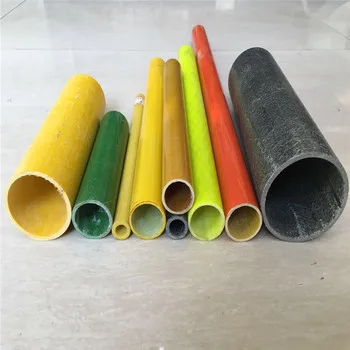Introduction:
When it comes to building and infrastructure projects, the choice of materials can have a significant impact on both performance and cost. One material that has gained substantial traction in various industries is structural fiberglass round tubes. Known for their durability, lightweight nature, and versatility, fiberglass tubes offer several advantages over traditional materials like steel and aluminum. This comprehensive guide will explore the benefits and applications of these remarkable tubes, helping you understand why they are increasingly becoming the material of choice for many modern-day projects.

structural fiberglass round tube
What Are Structural Fiberglass Round Tubes?
Structural fiberglass is a composite material made from glass fibers embedded in a resin matrix. It is incredibly strong, lightweight, and resistant to corrosion, making it an ideal choice for demanding applications. Fiberglass round tubes are hollow, cylindrical structures created from this material, designed to bear loads, withstand harsh environments, and offer flexibility in design.
Unlike metals such as steel or aluminum, fiberglass round tubes are non-conductive and resistant to a wide range of environmental factors, including chemicals, moisture, and UV rays. This makes them suitable for a variety of applications, from infrastructure projects to aerospace.
Key Advantages of Structural Fiberglass Round Tubes
Durability and Strength
One of the primary reasons structural fiberglass round tubes are chosen over traditional materials is their exceptional durability. Fiberglass does not corrode, rust, or degrade under exposure to moisture, chemicals, or extreme temperatures. This makes them ideal for environments where corrosion is a major concern, such as marine and chemical processing industries. In fact, fiberglass can outperform steel in many harsh conditions by maintaining its integrity for longer periods, even under stress.
Lightweight and Easy to Handle
Fiberglass is significantly lighter than steel or aluminum, which reduces transportation costs and makes installation easier. The reduced weight also contributes to the efficiency of structures, especially when it comes to large-scale construction projects. This lightweight nature does not come at the cost of strength; structural fiberglass tubes are designed to carry heavy loads while being easy to maneuver on-site.
Design Flexibility
Fiberglass is highly customizable, allowing for tubes to be produced in various shapes, sizes, and thicknesses. This design flexibility makes it ideal for projects with specific requirements. Unlike metals, fiberglass can be molded to fit precise design needs, making it a versatile material for both standard and unique applications. Additionally, fiberglass can be combined with other materials, such as resins, to enhance its properties for specific conditions.
Cost-Effectiveness
Although the initial cost of fiberglass round tubes might be higher than that of metals, the long-term savings more than make up for it. The low maintenance needs and resistance to damage ensure that fiberglass tubes last longer, reducing the need for costly repairs or replacements. Moreover, their lightweight nature means lower transportation and installation costs, further adding to their cost-effectiveness.
Common Applications of Structural Fiberglass Round Tubes
Construction and Infrastructure
In construction, structural fiberglass round tubes are used in a variety of applications, from support columns to guardrails and scaffolding. Their resistance to corrosion makes them particularly useful in infrastructure projects, such as bridges, tunnels, and highways, where exposure to moisture and harsh weather is common.
Marine and Offshore Applications
Fiberglass round tubes are widely used in the marine industry due to their resistance to water, salt, and UV damage. Whether it’s for piping systems, structural components, or boat frames, fiberglass provides a durable solution for offshore and maritime applications.
Aerospace and Automotive Industries
In industries that require lightweight and high-strength materials, such as aerospace and automotive manufacturing, fiberglass round tubes offer an excellent solution. They are used in structural components, supports, and frameworks, contributing to lighter and more fuel-efficient vehicles and aircraft.
Agricultural and Irrigation Systems
Fiberglass tubes also play a key role in irrigation systems and agricultural applications. Their strength and resistance to weather make them ideal for use in pipelines, water management systems, and other agricultural infrastructure.
Comparing Structural Fiberglass Round Tubes to Other Materials
Fiberglass vs. Steel
While steel has long been a go-to material for structural purposes, fiberglass outperforms it in certain areas. Steel can be heavy, prone to rust and corrosion, and may require more maintenance in challenging environments. On the other hand, fiberglass offers a corrosion-resistant, lightweight, and low-maintenance alternative that excels in both performance and cost-effectiveness.
Fiberglass vs. Aluminum
Aluminum is another popular material used in structural applications, but it often lacks the strength and durability of fiberglass in certain conditions. Aluminum may be lightweight, but it can be prone to dents and deformation under heavy load, whereas fiberglass is designed to handle stress and maintain its shape over time. Additionally, fiberglass is more resistant to environmental damage than aluminum, making it a superior choice in many cases.
How to Choose the Right Structural Fiberglass Round Tube for Your Project
When selecting a fiberglass round tube, there are several factors to consider. These include:
- Size and weight requirements: Ensure the tube can bear the necessary load without compromising on performance.
- Environmental conditions: Consider factors like exposure to chemicals, moisture, and UV light.
- Customization: Determine if the tube needs to be custom-shaped or sized for your project.
It’s also essential to choose a reputable supplier who can provide high-quality materials that meet industry standards.
Conclusion:
Structural fiberglass round tubes offer a unique combination of strength, durability, and design flexibility, making them a top choice for a wide range of industries. Whether you’re working in construction, marine, aerospace, or agriculture, these tubes provide an effective and cost-efficient solution. By understanding the advantages and applications of fiberglass tubes, you can make an informed decision for your next project, ensuring long-term performance and reliability.
Consider incorporating structural fiberglass round tubes into your next design, and experience the benefits firsthand!




























